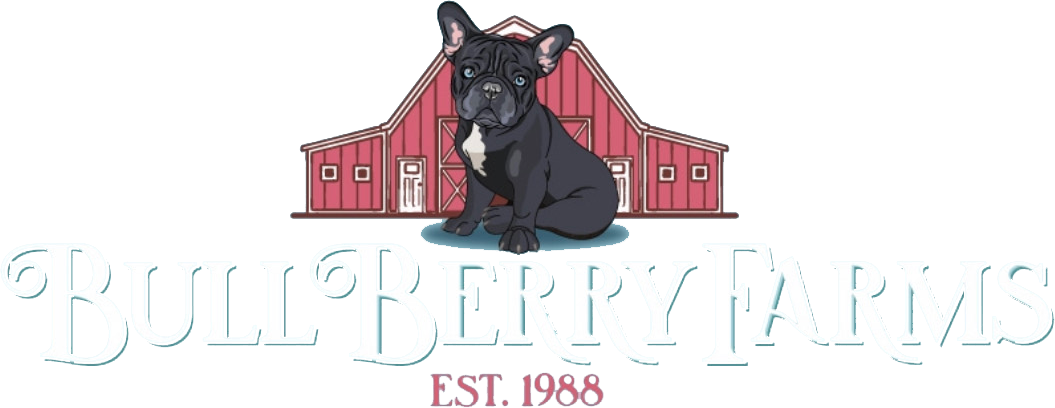BASIC: AKC STANDARD FRENCH BULLDOGS
Acceptable colors: white, cream, fawn (ranging from light fawn to a red fawn), or any combinations of those. Markings and patterns are: brindle, piebald, black masks, black shadings, and white markings. Ticking is acceptable but not desired. Brindle ranges from sparse but clearly defined black stripes on a fawn background to such heavy concentration of black striping that the essential fawn background color barely shows through (“black brindle”). Only a trace of the background color is necessary; in a brindle piebald, a trace of the brindle patterning in any patch is sufficient. All other colors, markings, or patterns are a disqualification. Disqualifying colors and patterns include, but are not limited to, solid black, black and tan, black and white, white with black, blue, blue fawn, liver, and merle. (Black means black without a trace of brindle.)
RARE MERLE/WHITE: DEAF AND BLIND GENE
In the Czar breeding lines, we have minimal pieds. Here at Czar Frenchies, we only breed pieds to solids to keep the solid white gene mute. We test all our pieds before breeding and test their offspring. I will not breed merle because it carries the highest defect rate amongst all colors in many different breeds. Breeders are taking risk breeding merle, which is a weak gene pool color.
French Bulldogs carry the same color genes as Boxers and Bullterriers. All white Frenchie puppies should be BAER-tested before selling. Ethically at least all predominantly-white Frenchies should be BAER-tested before being used in breeding. It is impossible to detect a Frenchie deaf in one ear without a BAER-test. Half deaf Frenchies live normal lives, but can pass deafness on to their puppies. The reason is the hearing eye and skin defects that are associated with the lack of melanin (color-pigmentation).
It is an old practice among experienced French Bulldog breeders never to breed white & white – and this rule of thumb is still valid today because such breedings earlier did result in deaf Frenchies and in Frenchies with low vitality, who had to be euthanized at the age of one and two years old. Also for the newbie breeder you should not breed white to yellow, fawn to fawn, or blue to blue.
*One must never breed two carriers of the dominant M or M[c] together* – double merle could cause organ defects and low vitality to the puppies. It is important to DNA test possible merle carriers well in advance of a mating. I also would instruct new breeders to stay clear of merle for breeding. Too many issues with blindness, deafness, and organ failure with this mutant color gene.
The recessive s[w] extreme white allele can give similar malformations, when inherited double from both parents but there is no DNA test to rule out hidden carriers of this allele. That is why two predominantly white Frenchies should not be mated. In horses they will not breed two white horses, the terminology is called Lethal White.
RARE CZAR COLORS: NOT RECOGNIZED BY AKC STANDARDS
Blue Fawn: Light fawn with blue mask, usually a very good quality coat but can be thin at first and thicken up after 4 to 6 months of age. Usually light eyes – either light brown or hazel, blue, green, or rarely brown. Can have same issues and the blue brindle, patches of hair loss, alopecia, dull coat and sometimes thin.
Blue Brindle: Blue with brindle pattern, may have a strong brindle pattern all over body or have solid blue grey color. Eyes are normally light yellow, green, blue, or light brown. Normal healthy coat 80% of the time. Signs of unhealthy coat, patches of balding, thin coat and very dull coat.
Blue Pied: Blue and white can be more white or more blue patterns. Light eyes and very unique pattern from one French Bulldog to the next. Usually healthy coat 95% of the time. Not susceptible to unhealthy coat issues like the blue brindle or blue solid.
Chocolate/Liver: Brown dog with yellow eyes that glow red. Can be brindle in pattern or mostly solid. This coat is normally a thick coat with a nice shiny texture and can remain healthy throughout the Frenchies life.
Cream/Platinum: Light cream but not white, off white or sort of silver looking, coat normally is coarser, not soft as the Basic colors or blues, has a thin or thick coat and texture is normally coarse. Eyes can be various from brown to blue.
Blue/Tan: Blue with tan points on legs, eyebrows, chest. Eye color same as the blue. The more tan points the more value this color represents.
Black/Tan: Black with tan points on the legs, eyebrows, chest. Eye color black or brown. The more tan points the more value this color represents.
Lilac: Light blue or green eyes, glows red, color can look light fawn to blue. Can be pied, brindle or even tan pointed. Gorgeous color, coat seems to be good and soft 90% of the time. I believe it’s the chocolate double gene in the color that creates the better coat.
FYI: This is my breeding experience and may not be the same outcome for another breeder.
BASIC CZAR COLORS: AKC STANDARD
Brindle/Black: Best coat overall, softer and very healthy coat. This dog is the best for healthy coat and great to add to your breeding program. Eye color brown or black.
Fawn: Overall coat good, soft and typically very healthy coat color. Can be red, gold or beige with black mask. Eye color brown or black.
Fawn/white: Pied very good overall coat, can be the coat that sheds the most. Mostly easier to keep clean than one should expect. Eyes can be variations to light brown to black. Tear stains more common also.
Black /white: Coarse coat, shiny coat, soft coat. Variations are one side of the spectrum to the other. Eye color normally dark.
Coat condition is based on Czar lines and could be slightly different from other breeders.
